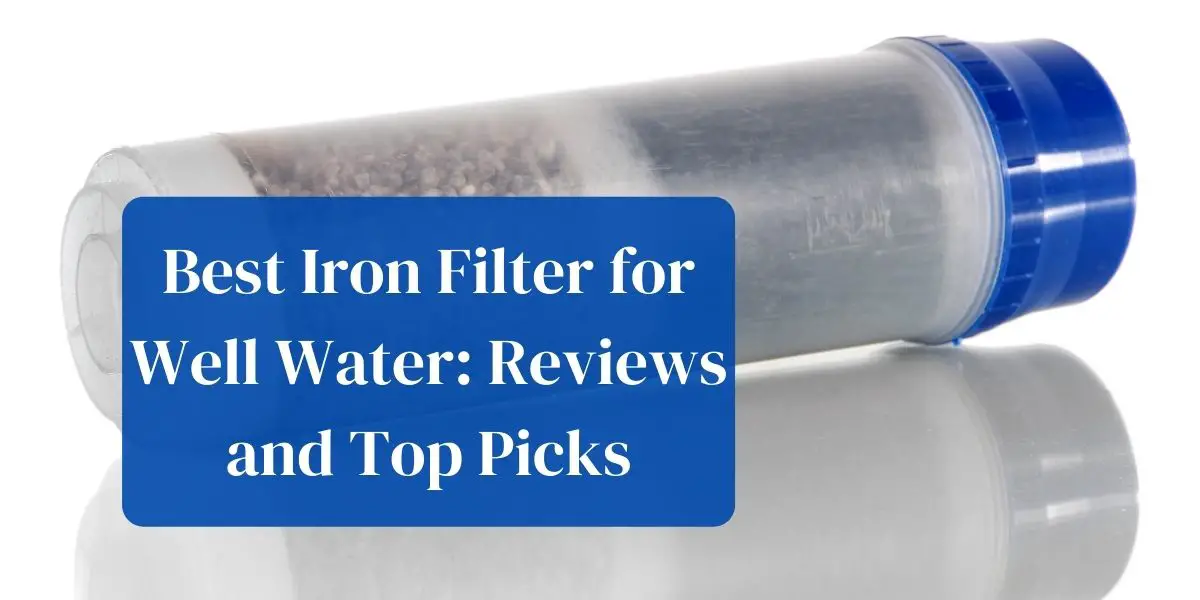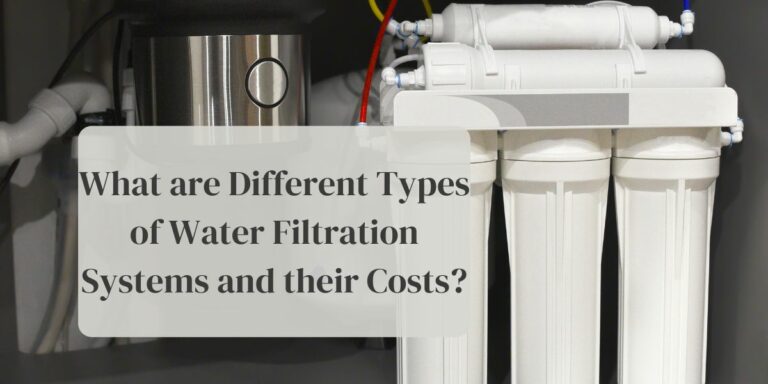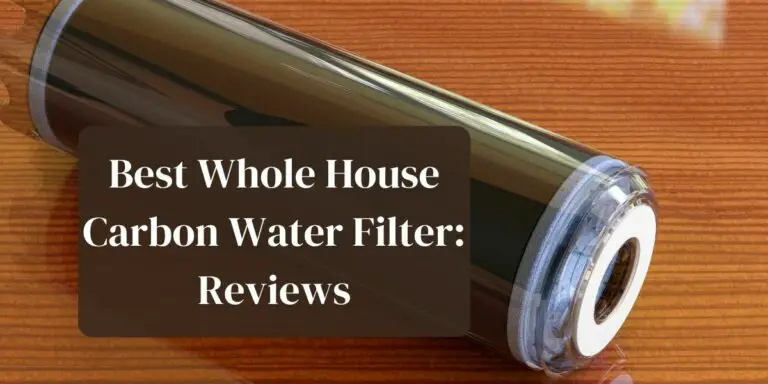One of the biggest headaches you’re going to encounter when using water from a well is the presence of iron and manganese. Water coming directly from a well will carry some elements of the ground that surrounds it. An iron filter for well water is an affordable and effective solution that many homeowners use to improve their water quality.
In this post, we’ll look at the best iron filter for well water options.
Elements that can leech from the ground include iron, calcium, magnesium, hydrogen sulfide, and other contaminants. When iron is present in water, it smells and tastes awful. The raw water stains your laundry, kitchenware, toilet bowls, and sinks, leaving behind unsightly brown or orange streaks.
You will need to do more repairs and replacements on your plumbing system and home appliances when using the untreated water. If this sounds familiar to you, don’t worry, there are many practical solutions to get rid of this nuisance and give you clean water.
Table of Contents
- Best iron filter for well water: 5 picks
- How iron gets into your well water
- Why you might need a whole house water filter
- What to consider when buying the best iron filter for well water
- Conclusion
Best iron filter for well water: 5 picks
While the iron levels in your well might not be significant, nearly everyone with a well can benefit from an iron filter. An iron filter will not only get rid of the smell and bad taste, but it will also protect your pipes and other fixtures in your home.
The best iron filter for well water will also prevent staining on your laundry, dishes and tubs. If your filter doesn’t get rid of the bad smell, you can call the company’s customer service for assistance.
Below are some of the top iron filters for well water reviews we found on the market. We hope you’ll find it useful as you make a decision on what really fits your need.
1. Aquasana EQ-WELL-UV-PRO-AST Whole House Well Water Filter System
The Aquasana Water Filter is a comprehensive whole house filter that helps you filter out iron and other contaminants for great tasting water in your home. It includes a saltfree water descaler and a UV sterilight filtration.
The system removes harmful water contaminants like herbicides, pesticides, silt, sediment, rust, lead and mercury without the use of chemicals or salt. Have a churning capacity of 7 gallons per minute and a 500,000-gallon purifying capacity.
The package comes with a dual filtration tank, a salt free water conditioner, UV, 20 prefilters, post-filter, brass fittings, bend support, and shutoff valves in multiple boxes. This whole house water filter protects your home appliances and plumbing from the harmful effects of excess iron.
Excess iron can form scales in your water pipes and heating appliances and lead to expensive repairs. It removes 97% of chlorine from the regular tap water and kills 99.9% of bacteria and viruses through the UV filtration unit.
Since it’s a saltfree system, it doesn’t require salt,electricity, or lots of water. Saltfree systems do not require much maintenance since you don’t have to keep adding and checking salt levels.
There is no risk of depositing sodium into the environment, as in the case with some kinds of water softeners. This filter will work for you if you’re looking for a filter that doesn’t remove minerals from your drinking water.
With the activated carbon filters, you will be sure that your water is free of sediments and pollutants. This system features a unique up-flow dual tank design that prevents clogging while increasing the contact time with the contaminant-removing media.
Pros
- Doesn’t need electricity
- No costs for salt
- Optional UV filtration
- Easy to maintain
- Dual tank design
- Ideal for large households
Cons
- Not easy to install for new users
- Clean, Great Tasting Water From Every Tap In Your Home - Activated carbon is effective at reducing organic chemicals including pesticides & herbicides while allowing for a fast and reliable flow rate with no noticeable change in water pressure.
- High-Performance Well Filter System - Salt-free conditioner, carbon & KDF filtration engineered to maximize filtration and reduce scale while leaving healthy minerals in your water. This system will NOT reduce Total Dissolved Solids (TDS)
- Cost Efficient & Long Lasting - Clean water for less than $0.01 a gallon - Save twice as much compared to other brands on purified water for 500,000 gallons or 5 years
- Easy Maintenance - No draining or back flushing needed - Easily replace pre and post filters every 2 months for best filtration and flow rate.
- Top-Grade Install Kit & Components - System includes filter tank, conditioner tank, 20" pre-filter, post-filter, brass fittings for 1'' or 3/4'' pipes, bend supports, and shut-off valves – Item may ship in more than one box and may arrive separately
2. Home Master Whole House Three Stage Water Filtration System
Home master 3-stage filter is an excellent option for well water laden with iron, and sulfur with up to 3 ppm. This Whole House water filter removes up to 95% of pesticides, herbicides, sulfur odor, and sediments before entering your home.
The initial step involves a multi gradient polypropylene filter with four layers of different micron sizes followed by a second stage filter, which efficiently and effectively works to reduce iron, manganese, and sulfur up to 3 ppm.
The last step uses a filter with granular activated coconut shell carbon to remove chlorine, bad taste, and odor.
This essential three-stage filtration improves the quality of your drinking water and prevents scale formation on your fixtures and appliances. Perhaps the most desirable feature in this system is that the system delivers filtered water in your pipes quickly without drawing down the pressure.
Home Master Whole House water filter features large filters,housings, and fittings. These features work harmoniously to provide very high water pressure of up to 15 gallons per minute, meaning you can still use your water as the system is running since it doesn’t affect your water pressure.
In addition to the consistent flow rate, the oversized filters ensure you don’t often need replacement as you would with smaller sized filters. The coconut shell carbon filter can purify up to 95,000 gallons of water lasting for about a year for medium households.
The filter requires little or no maintenance,which saves you cost, time, and energy. The package includes a fully assembled Home Master Filter system with filters, mounting brackets with bolts, housing wrench, and a manual.
Pros
- Doesn’t affect pressure n pipes
- Removes odor and improves taste
- Easy to install
- Fully assembled package
- Easy to maintain
Cons
- Doesn’t remove hardness in water
- Optimal Performance for Well Water: Specifically engineered to tackle well water contaminants, this system excels in removing up to 95% of iron, manganese, sediment, chemicals, and other pollutants, ensuring clean and clear water devoid of foul tastes and odors. For city water users, consider the Model #HMF2SmgCC for tailored filtration.
- High Flow Rate and Pressure: Features massive filter housings with 1-inch ports that maximize water flow across your entire home. Experience strong, consistent water pressure with a capability of up to 15 gallons per minute.
- Advanced Filtration Technology: Includes a 4-layer 25-10-5-1 micron replaceable sediment filter that not only provides finer filtration but also boasts a greater dirt holding capacity, reducing the frequency of maintenance.
- Comprehensive Contaminant Removal: Achieve superior purification that removes up to 95% of various contaminants, including iron, manganese, and sediment, plus chemicals that cause unpleasant tastes and odors in water up to 3 PPM combined load.
- Reduced Maintenance Frequency: The oversize filters improve flow rate and significantly decrease the need for maintenance, making this system both effective and convenient.
3. Express Water Heavy Metal Whole House Water Filter
Express Water Heavy Metal Whole House Water Filter features three large filters that can deliver up to 0.25 gallons of water per second. Depending on the quality of your water and other factors, the filter set can do an average of 100,000 gallons of water before the need for replacement.
This could be what you need if you want to get rid of a wide range of pollutants. It will also eliminate bacteria and viruses from your drinking water. Each cylinder has a dedicated pressure gauge to help you monitor and control the state of each system.
The first stage in the process is a filter to remove silt, debris, rust, and any dirt from the water. This traps coarse elements from damaging the filters by filtering out particles up to 5 microns. The outer layer catches the larger contaminants while the inner layer removes the finer particles.
The second stage removes iron, manganese, copper, hydrogen sulfate, chromium, nickel, and heavy metals like lead sulfur and mercury through a Kinetic Degradation Fluxion (KDF) system. If you’re living in a place with industries and heavy use of chemicals, this could be your best bet.
The filter will eliminate Volatile Organic Chemicals (VOC), herbicides, pesticides, and other water-soluble pollutants. In the last stage, an activated carbon block the taste and smell of the water by trapping chlorine and chemicals that cause bad tastes and odors.
This unit is easy to set up and doesn’t require much maintenance. It comes with a full set of filter housings, three pressure gauges, and a stainless steel frame. It comes already fitted in a freestanding stainless frame, meaning you can place it on the ground or mount it on a wall.
Pros
- Pressure gauges
- Heavy duty stainless
- Steel mounting
- Low maintenance
- Durable
Cons
- Bulky
- Reduce Contaminants & Enjoy Clean Water: Get clean, safe water for your family using our 3-Stage Heavy Metal Water Filtration System. This advanced water filter system eliminates hazardous contaminants like mercury and lead, delivering odor-free, crystal-clear water throughout your home.
- Improved Water Quality: Upgrade your water quality with our 3-stage water filtration system. Eliminate impurities and chemicals for a refreshing, clean taste. Enjoy healthier, great-tasting water straight from your tap!
- Comprehensive Filtration: With 1" standard connections and quick-change cartridges, our in-house water filter system efficiently removes heavy metals, chlorine, and more. Elevate your well-being with improved water quality that positively impacts your skin, hair, and general health.
- High Versatility & Compatibility: Built with durable stainless steel and equipped with brackets and pressure gauges, this filter system is designed to work with various water sources such as well, tap, or municipal, offering both inline and whole home filtration solutions.
- Engineered for Durability: Offering up to 100K gallons of purified water, our system is built for longevity. Features easy-to-change cartridges, transparent sediment housing, and pressure gauges. Enjoy benefits like no wastewater, consistent water pressure, chlorine-free showers, cleaner plumbing, and longer appliance life—all for a hassle-free, superior hydration experience.
4.iSpring WGB32BM 3-Stage Whole House Water Filtration System
The iSpring filtration system is a point-of-entry kind of system where you install and filter water from the source to remove iron, chlorine, sediment, dust, cloudiness, and heavy metals. This means any water flowing in your home has passed through the three-filtration stage.
In addition to removing contaminants, the WGB32BM will also reduce odor and a bad taste in your drinking water. It does this without removing essential minerals from the water that could benefit you and your pets.
Related: Is reverse osmosis water good for pets?
It’s a good note that hard water can bring adverse effects on your appliances and plumbing, sothe system works for you if the hard water doesn’t affect the quality of life.
Typically, the three-stage filtration utilizes iron manganese, a carbon block, and a sediment filter to trap and remove harmful contaminants. It effectively reduces iron and manganese down to 0.01 ppm, which makes it ideal for well water.
The first stage includes a 5 microns high capacity sediment filter to remove large particles that could clog the other filters. It then passesthrough a 5-micron carbon block filter, which gets rid of bad smell, and taste in water.
It also reduces chlorine levels up to 95% and makes the water safer for use. The last stage uses an iron-manganese filter that removes iron from 3 ppm down to 0.01ppm and manganese from down to 0.01ppm.
It’s also a great option if you want to remove heavy metals like lead and mercury. This shell carbon activated filter can provide 100,000 gallons of water before it needs a replacement giving a full year of water supply to a medium-sized family.
Pros
- Easy to install
- Removes sediment and fine particles
- Excellent customer service
Cons
- Soften hard water
- Whole house water filter that protect your family and household appliance from iron, manganese and more: Our 3rd stage iron water filter (FM25B) is specially designed for iron and manganese removal, reducing iron (MAX 3.0 ppm) and manganese (MAX 1.0 ppm). The water filter lasts up to 3 times longer than greensand due to the catalytic media not being consumed in the process. This whole house water filter system also removes sediment, chlorine, rust, herbicides, industrial solvents, and more.
- DIY installation and maintenance - refer to our manual and our helpful YouTube videos for easy DIY installation. With 1 in. NPT inlet / outlet and 20 in. x 4.5 in. water filter cartridges, WGB32BM whole home water filter system has minimum impact on water flow (up to 15 GPM) and requires minimum maintenance.
- Top-notch quality - the first stage high capacity polypropylene sediment filter achieves filtration down to 5 microns. The second stage carbon block filter is made of high quality coconut shell carbon for maximum filtration efficiency and filter life. Both water filters are tested by an independent third-party to meet NSF/ANSI standards. Both water filters have a capacity of 100,000 Gal. of water, enough to supply a family of four with clean water for a full year.
- Peace of mind customer service - register online to activate your 1-year manufacturer warranty and life-time free tech support from U.S. local support team. We stand behind our products and if you encounter any problems with any of our products please reach out to us immediately. We are happy to help!
- Please note - this whole house water filter is installed at the main water supply line in order to treat all the water in your home; unlike an RO system, this whole house water filtration system will NOT reduce Total Dissolved Solids (TDS) and instead keeps healthy minerals in your water; if you are interested in a filter that removes TDS consider our iSpring Reverse Osmosis (RO) systems. The cartridges are individually wrapped to ensure freshness. Please unwrap the cartridges before use.
5. Iron Pro 48K Combination Water Softener & Iron Filter
If you?re looking for a permanent solution for iron and hard water problem in your home, you might want to try out this model. Iron, calcium, and magnesium can wreak havoc on your water appliances and plumbing.
It would, therefore, be great news to find a solution to remove both from your water supply. The Iron Pro 48k combination. Water softener & Iron filter is a comprehensive system containing a tank,control head, fine mesh resin, and brine tank with an LCD.
The system will eliminate red staining caused by iron and scale from hard water, in a single process. Besides, the fine mesh water softener resin can remove all hardness and some iron present in your water. The purifying capacity for this system is 48,000 gallons and a flow rate of 14 gallons per minute.
The LCD, the touchpad control panels, and a 48 hour internal power back up give this unit a friendly and convenient user interface. With this system, you can remove even the most stubborn water hardness and get rid of high levels of iron (up to 8 ppm)and manganese (up to 6 ppm), sediment, sand.
The system uses a meter based regeneration process, which means that it measures the water you use, and regeneration happens only when the system needs it. When water usage increases,regeneration happens more often. Installation for this unit is a little complex for new users.
For easier installation, however, you can follow an installation video from the manufacturer. This set is affordable and comes in two warranties, including a five-year warranty for the control head and a ten-year warranty for the tank.
?Pros
- LCD
- Touch pad control panel
- 2 in 1 system
- Effectively softens even the hardest water
Cons
- Might not remove all iron especially ferric iron
- Requires time to install
- Water softener, iron filter, all in one -- Ships Pre Loaded for easier installation - Link to installation video sent through Amazon messenger upon shipment
- 48,000 Grain Capacity, fine mesh resin designed for removing the highest water hardness as well as high amounts of iron & longer life
- Installation video link is emailed through Amazon messaging when unit ships
- All in one system removes the highest hardness and iron. Removes all hardness, iron up to 6-8 ppm range, manganese up to 6 ppm, sediment, sand, rust
- Structural made in the USA 10 x 54 inch black fiber glass mineral tank & Structural made in the USA black 14x34 brine tank with safety float
How iron gets into your well water
Typically, iron gets into your water through seeping from the earth as it is the most abundant mineral in the earth’s crust. Depending on the depth and geological location, the levels of iron can be different, but no matter how well you maintain your well, there is still a significant amount of iron in your water.
Besides, if the pipes and casings are made of iron, the iron oxide from the corroded pipes can get into the water. Prolonged exposure to oxygen and water causes iron to oxidize into rust.
The corroded water fixtures leave brown flecks in your water and orange stains on your tubs. You can remedy this situation by replacing the plumbing and fixtures on your well.
Effects of iron on well water
Iron is an essential mineral that a human needs in their diet, and it is highly unlikely you’ll consume toxic amounts in your drinking water. Many people will want to get rid of iron since it has adverse effects on their lives.
Here are some of the reasons why you might need to get rid of iron.
Stains and slime on appliances
You’re probably familiar with the frustrating repercussions of iron in a well . The stains it leaves behind on your dishes, laundry, bathtubs, and toilet bowl.
Any metallic appliance plumbing in your well becomes discolored when exposed to water rich in iron. These stain are hard to clean, no matter how hard you try and could cost you energy and time.
Clogged pipes and drainage
Rust particles and fragments can be stuck as the water travel down your pipes. If they sit stagnant for extended periods, the iron accumulates in your pipes and clogs the system. This can lead to expensive repairs on your washing machines and other appliances.
Bacterial iron can cause the most severe clogging issues It leaves behind thick brown slime, which collects in pipes and causes erratic water pressure giving the pathogenic bacteria a place to thrive.
Foul odor and taste
Iron in water can make even the best foods and beverages take an extraordinary metallic taste. It can cause water impossible to drink for some people, thanks to its brown-orange or yellow coloration.
Even when it is clear, it will have a sharp and unpleasant taste and odor.
Discoloration on hair and skin
When your hair absorbs iron, it can develop a dark discoloration. If your hair is light-colored, it turns orange while darker hair takes on some red highlights. Your hair can also become brittle and dry, not to mention the awful metallic odor it leaves on your hair.
Dissolved minerals such as iron can cause excessive scum residue on your skin when you take a shower. The residue on your skin clogs the pores and causes you issues with acne and eczema.
Health risk for some
Individuals with hemochromatosis should not consume high levels of iron. This is a hereditary condition that causes the body to absorb too much iron without a way of getting rid of it.
The excess iron poisons the body organs leading to cancer, weight loss, irregular heartbeat, and cirrhosis of the liver.
Forms of iron common in well water
There are three forms of iron in private wells. These are ferrous,ferric and bacterial iron.
Ferrous iron
This is the water-soluble iron that you can’t see, and that’s why it’s also called clear water iron. This water comes out of the faucet while clear and only turns red after getting exposed to air.
You can’t filter out this kind of iron in that form. However, you can remove it through an oxidation process that turns it into sediments, which are then filtered out.
How to remove ferrous iron
As we had earlier stated, ferrous iron is soluble and invisible.One of the ways of removing this kind iron is using a water softener. While water softeners are primarily useful in removing hardness in water, they can also remove soluble iron from your well.
This happens in an ion exchange process. Since sodium ions in the resin tank carry a negative charge, they attract the positively charged cations in the iron water. The ferrous ion sticks on the resin beads, while sodium ions are removed from the system as waste.
You need sediment prefilter if it also contains ferrous iron. If you’re using a water softener for treatment, ensure you regularly flush the system to avoid the resin bed from clogging with rust.
Another good way of getting rid of ferrous iron is to convert it into solid particles that a filter can remove. These kinds of filter systems are called oxidizing filters. You can opt to use any of the following media.
Removing ferrous iron with manganese greensand
This is a potent oxidizer. When ferrous iron and manganese are exposed to the oxidizing agent, and they turn into solid. The resulting ferric iron is then flushed out of the system.
Manganese greensand can treat water with up to 15 ppm of iron. Remember that just like water softeners, these iron filters need regular backwashing to clean out any iron precipitate on the media bed.
Backwashing ensures that no bacteria grows inside the system and so it’s an essential process for safe water. Lack of sufficient backwashing might eventually cause your good water filter systems to fail.
Removing ferrous iron with KDF
KDF (Kinetic Degradation Fluxion) is a system that uses a chemical process to remove chlorine andiron from water supplies. It also gets rid of heavy metals like mercury and lead as it passes through the filters. The media in KDF filters converts ferrous iron into ferric iron oxide, making it easy to filter out.
Such a filtering system works best in low water volumes and low pressure because it requires extended periods for the oxidation process to complete. This process is ideal for ferrous iron concentrations of 10 ppm or more.
Removing ferrous iron with Birm
This is another good option that you can use as an oxidizing media to remove clear water iron from well water. While manganese greensand uses chemicals in the oxidation process, birm does not require a chemical oxidizing agent to remove ferrous iron.
If you have water with high levels of pH, birm will make an excellent oxidation option. Systems that use birm combine it with calcite to raise the pH, enabling the birm to oxidize the ferrous iron and remove it from the water.
Ferric iron
This is the iron that gives your water an orange-brown coloration often in oxygen-rich water sources. Ferric iron is insoluble and viscous, which causes clogging in your plumbing and home appliances. It is easy to get rid of this iron mechanically using a regular filter.
Removing ferric iron from well water
Using sediment filters is ideal for homeowners with water infested by ferric iron. The sediment filters out dirt, particles, and any debris from entering your house pipes.
It’s also good to ensure that your sediment filter has the smallest available micro rating to filter out fine particles adequately. Sediment filters made of string-wound natural cotton are excellent in removing iron in your supply.
Before choosing this option, it’s good to note that the filter will only work with ferric and not ferrous iron. That’s why you need to be sure about the condition of your water.
Using sediment filter for water with ferrous iron means that you end up with stained toilet bowls, stained laundry, and ugly looking dishes.
Bacterial iron
Among the most challenging forms of iron to remove in well water is bacterial iron is kind of iron forms when bacteria bonds with iron forming a bright red sludge that resembles tomato paste.
While iron can cause damage to your water system and appliances, there are no serious effects of having it in your water unless you consume water infected by iron bacteria. Iron bacteria are microscopic organisms that feed of iron.
When these bacteria leave behind iron waste, a gross slime that sticks on pipes, it creates an active environment for other harmful bacteria to thrive and they can cause infections in human beings.
You will find this in abandoned wells or wells that lack proper maintenance. When bacteria iron forms inside of pipes, it can clog your well pump, block your plumbing fixtures, and leave slimy red residue in your toilet bowl.
Bacteria iron can ruin your softening system, sediment prefilters, and other water treatment appliances. While the iron is not harmful in itself, it provides an excellent ground for harmful pathogens to grow and reproduce.
Removing bacterial iron from iron water
You can only identify iron bacteria by microscopic analysis. To remove the slimy invasive pollutant in water contaminated with bacterial iron,you can opt to use shock chlorination as a treatment option.
This process involves introducing a high chlorine concentration to the well water to disinfect the water and the whole filter system. Getting rid of this iron is labor-intensive and time consuming.
You must ensure you expose the entire well, the well pump, and all the plumbing system to the shock chlorination. The process eradicates the bacteria on the iron and makes it easy to remove the iron using a softener,sediment filter, or oxidizer.
Shock chlorination might not resolve this bacterial infestation permanently, so you need to do this regularly, like twice in a year. If repeated treatment doesn’t solve the problem, it would be advisable to install a continuous application system to automatically inject low amounts of chlorine into the well.
You also need to install a permanent filtration if you install a continuous chlorination system to remove the iron particles.
Why you might need a whole house water filter
The type of filter you choose depends solely on the quality of your water and the specific problem you want to solve. Getting rid of chemicals, minerals, or gases might need different processes and technologies.
Before you pick on any of the many whole house water filter models available in the market, you need to test and know the cause of the problem in your well water and if it contains hardness minerals and other contaminants.
The presence of manganese and iron means you need to invest in a whole house water filter. If you want to remove calcium and magnesium to soften the water, a whole house water filter with a water softener is ideal.
Further, some models include a UV filtration for processing drinking water, but this should depend on your preferences and budget.
How does a whole house water filter work?
Whole house water systems use different mediums to filter out contaminants. A basic whole house water filter comprises several separate filters, and all are meant to filter out sediment or iron.
When water enters the filtration system, it goes through a sediment prefilter that removes larger particles like sand, debris, and silt from the water. This filter also helps to keep the next filter in good condition and ensures it lasts long without needing frequent replacement.
It then passes through an activated carbon filter which removes a lot of contaminants thanks to its big porous surface.The surface attracts the contaminants and traps them in a process called adsorption.
Here, it filters any left sediment along with foul smells and tastes. When it leaves the carbon filter, it goes through copper-zinc and mineral filter. This filter is an essential part of this process since it removes heavy metals present, any bacteria, and other microorganisms.
Some models of whole house water filters include a water softener or descaler system which uses an ion exchange system.water enters the softening system, it passes through a resin bed that contains sodium ions where ion exchange takes place.
If your water contains calcium and magnesium ions, these ions replace the ions in sodium, and this makes the water soft. Some whole house water filters might have a post-filter option. The post-filters stop even the smallest particles from reaching your pipes.
Though less frequent, a UV filter is an essential component which kills any remaining bacteria, viruses, or micro organism that by passed the other filters. Some systems could include air injection functionality that helps convert the soluble iron to rust, which then makes it easy to filter out the rust.
Using air injection is not a guaranteed way of filtering sediments since not all ferrous converts to rust, so you might still find clogging in your appliances after all. If you want to get rid of iron, it’s crucial to have an accurate knowledge of what kinds of iron is present in your well.
What to consider when buying the best iron filter for well water
You might not be able to control iron from seeping into your water, but you can control it from getting into your house. The most effective way to remove iron from well is by using a filter system.
No single filter is fit for every homeowner. What worked for your neighbor might not work for you. It’s critical to know which features you need before you buy the best iron filter.
You need to pick a filter with features that work for you. If you have moved to a new home,your filter or water softener might fail to work with your new water supply.
So if you’re looking for the best iron filter, there are factors to consider before you make a purchase. Here are some of them.
Water composition
Before choosing the best well water filter, a water analysis is vital to know what is precisely is in it. For instance, apart from having iron, some well waters are naturally acidic. In such a case, you have to treat it for acidity before removing iron.
This is because most iron filters cannot remove iron in the acidic state. Additionally, wells located near industrial sites, or close to a heavily agricultural area where people use chemicals, your water might contain contaminants.
A general mineral testing is required to determine the levels of pollutants that might need removing, which will determine the kind of filter you will need to get rid of bad taste and odor
Testing for iron in well water Iron in itself is part of a good, healthy diet, and the human body requires it to produce red blood cells. EPA considers iron as a secondary drinking water contaminant.
Secondary contaminants are contaminants that are not necessarily dangerous to consume but have aesthetic or cosmetic effects like causing stains, foul tastes, etc.
However, high levels of iron in the body can cause toxicity if your body doesn’t eliminate it. You might want to test for the iron levels in your well. So it’s good to understand what levels are acceptable.
If your test shows that it contains unacceptable contaminants, you can look for alternative water supplies. You can also opt to treat your water by removing the contaminants. Removing iron from the well water is contingent on understanding what form of iron is present.
Iron test strips can also reveal the parts per million of iron in your well water. Water with more than 0.3 p.p.m (parts per million) of iron will require you to invest in a filter for well since it will have adverse effects on your clothes, appliances, dishes, and all.
Micron capacity
The micron filtration capacity tells you the smallest particles a filter can remove. The best whole house filters use a series of micron filters with different sizes to ensure your pipes are free from all sediment.
Typically, you need a 1-micron filter for bacteria and parasites, while the 5-micron filter can effectively remove all sand and rust. You might consider a model with a UV sterilization functionality to ensure your water is free from all microorganisms.
Virtually all filtration systems decrease the water pressure as it moves through the system. It is crucial to consider the pressure from your water supply and that on your filtration system.
The pressure in both will ensure decent water pressure in your kitchen and bathroom pipes.
Flow rate
Most of the water filtration systems needs a specific minimum flow rate to operate optimally. You need to check the flow rate of your water supply since it must be consistent with the filter flow rate.
For instance, if your water filtration requires 10 gallons per minute,the water supply must supply the 10 gallons for a smooth process. Ensure that your supply meets the flow rate of your water filter so that there is enough force to move the water through the media bed, lift the media, and allow self-cleaning.
Conclusion
You need to invest in an iron filter to remove iron and other contaminants from your well water. High levels of iron can cause health risks for some individuals.
Similarly, high concentrations of manganese in drinking water could intoxicate the nervous system and, therefore, not safe for pregnant women and the elderly.
It’s important to have a laboratory test done on your water to determine the concentration of iron, manganese or hydrogen sulfide is in your well water.
Water with more than four ppm might need a whole house water softening system with an iron filter as well as a water softener to mitigate the problem.
Not every water softener system can remove iron from water. You need to check with the manufacturer’s specifications. Before buying a well water filter, ensure that your iron and manganese concentration in your water does not exceed the maximum removal capacity indicated in your iron filter.













